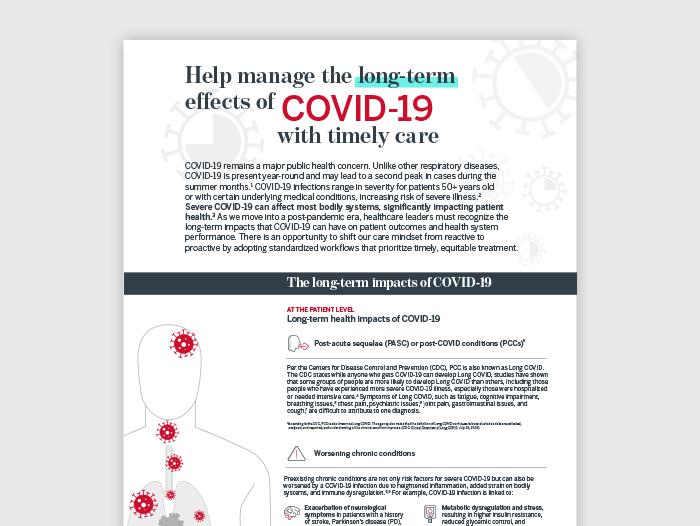Auto logout in seconds.
Continue LogoutAs the weather gets colder, respiratory viruses, including COVID-19, the flu, and respiratory syncytial virus (RSV), are on the rise across the United States.
Respiratory viruses are on the rise
Last week, CDC Director Mandy Cohen updated the House Energy and Commerce Subcommittee on Oversight and Investigations on the current respiratory virus season in the United States.
RSV
According to Cohen, RSV season is now "in full swing," with many cases occurring in the southern part of the country. She added that RSV may be "near [its] peak" for this season.
So far, hospitalizations for RSV have remained relatively low, although they have risen slightly in recent weeks. In late October, RSV accounted for 0.5% of all hospitalizations, which later increased to 0.8% as of Nov. 18.
Although overall RSV hospitalizations are low, they are driving a significant number of hospitalizations among children. Since the first week of October, weekly RSV admission rates among children have increased by 69%.
Flu
"Flu season is just beginning across most of the country, though accelerating fast," Cohen said. "… We're actually having a pretty, what I would say, typical flu season. We do expect to see a lot more flu cases over the course of December and January."
For the week ending Nov. 25, 3.9% of healthcare visits were for the flu, a 0.2 percentage point increase from the week before. Most the United States is also reporting an increase in flu cases, with areas of the South Central, Southeast, Mountain, and West Coast regions reporting significant activity.
Flu hospitalizations have also grown for three consecutive weeks. For the week ending Nov. 25, there were 4,268 new flu hospitalizations.
COVID-19
Although COVID-19 cases are still "relatively low," Cohen noted that they are "still the primary cause of new respiratory hospitalizations and deaths" in the United States. Currently, there were around 15,000 COVID-19 hospitalizations and 1,000 deaths every week.
"Covid is still the respiratory virus that is putting the most number of folks in the hospital and taking their lives," Cohen said.
According to wastewater data from CDC, COVID-19 cases are likely on the rise. Between Nov. 1 and Nov. 20, the proportion of wastewater sites that reported increases of SARS-CoV-2 samples rose from 22% to 32%. Similarly, the proportion of sites that reported decreases in viral samples fell from 60% to 49%.
Health experts encourage vaccination to protect against these viruses
According to Cohen, it is important for Americans to get vaccinated to protect themselves against illness, especially since vaccines for all three of the circulating respiratory viruses are now available.
So far, around 15% of adults ages 60 and older have been vaccinated against RSV, and more than a third of adults and children have received a flu shot. However, CDC said that vaccination rates for the new COVID-19 vaccine are lower than it would like to see. Currently, only 16% of adults and 6% of children have received a new COVID-19 vaccine.
COVID-19 vaccination rates in vulnerable settings such as nursing homes are also low. So far, only 27% of nursing home residents and 6% of nursing home staff have received the new COVID-19 vaccine.
"It's really important that this group gets boosted because there they are the group that will be hospitalized with illness and can have severe infection and poor outcomes," said Preeti Malani, a clinical professor and infectious disease physician at the University of Michigan Health.
Although the U.S. population has more immunity to COVID-19 than it did before, health experts have said that continued low vaccination rates could leave the country vulnerable to another surge if a new, more immune-resistant variant emerges.
"My concern for COVID-19 is that we're not ready for any variants that this virus will produce," said Ali Mokdad, a professor of health metrics sciences and chief strategy officer for population health at the University of Washington.
According to research from KFF, many people are no longer worried about COVID-19, which has contributed to low vaccination rates. Among people who were previously vaccinated, around half said a lack of worry was why they haven't received the latest COVID-19 vaccine. Additionally, 37% said they've been too busy to get the shot, and 32% said they were waiting to get the shot later.
"The sense of worry or concern is much lower. And therefore that seems to be what is likely driving people’s action. Or in this case, inaction," said Jen Kates, an SVP at KFF. "It's kind of a perpetual problem in health prevention in general, if prevention efforts are working, people don’t see the problem, and then stop taking the measures that prevent the problem," (Weixel, The Hill, 12/5; Twenter, Becker's Clinical Leadership, 12/1; Goodman/McPhillips, CNN, 11/30)
Given the potential influx of respiratory diseases in the United States, health experts are advising caution this holiday season. Here are five ways you can keep safe.
Don't miss out on the latest Advisory Board insights
Create your free account to access 1 resource, including the latest research and webinars.
Want access without creating an account?
You have 1 free members-only resource remaining this month.
1 free members-only resources remaining
1 free members-only resources remaining
You've reached your limit of free insights
Become a member to access all of Advisory Board's resources, events, and experts
Never miss out on the latest innovative health care content tailored to you.
Benefits include:
You've reached your limit of free insights
Become a member to access all of Advisory Board's resources, events, and experts
Never miss out on the latest innovative health care content tailored to you.
Benefits include:
This content is available through your Curated Research partnership with Advisory Board. Click on ‘view this resource’ to read the full piece
Email ask@advisory.com to learn more
Click on ‘Become a Member’ to learn about the benefits of a Full-Access partnership with Advisory Board
Never miss out on the latest innovative health care content tailored to you.
Benefits Include:
This is for members only. Learn more.
Click on ‘Become a Member’ to learn about the benefits of a Full-Access partnership with Advisory Board
Never miss out on the latest innovative health care content tailored to you.


